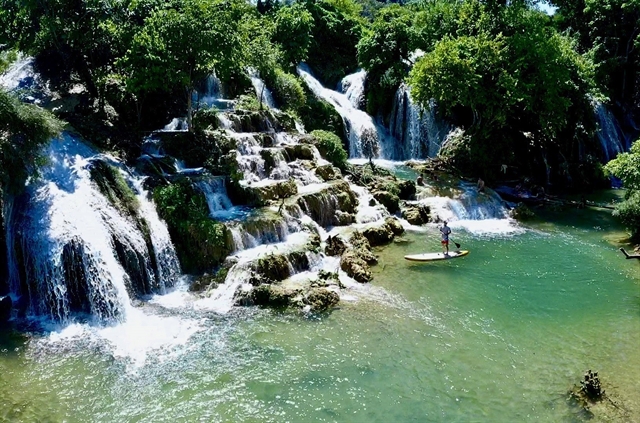
Bản Sầm Waterfall in the Non Nước Cao Bằng UNESCO Global Geopark. VNA/VNS Photo
HÀ NỘI Việt Nam has been chosen to host the 8th Asia Pacific Geoparks Network (APGN) Symposium.
The announcement was made as the 7th Symposium drew to a close at the Satun UNESCO Global Geopark in southern Thailand on Sunday.
The next APGN will take place at Non Nước Cao Bằng UNESCO Global Geopark in the northern province of Cao Bằng in 2024.
The 7th APGN Symposium was attended by representatives from the UNESCO Global Geoparks Council, APGN Advisory Committee and APGN members from countries in Asia-Pacific, including delegation of Cao Bằng Province, headed by Deputy Secretary of the Provincial Party Committee and Chairman of the Provincial People's Committee Hoàng Xuân Ánh.
The Organising Committee highly appreciated the active participation of the delegates in sharing experiences in the construction and development of geoparks in 10 categories, including management and protection, the promotion of the value of indigenous geological and cultural heritages, and sustainable tourism development.
Particularly, they praised the efforts of Non Nước Cao Bằng Geopark in its construction and development through many creative and practical solutions, which helps to create many strong values in the network.
Assessing that the Vietnamese geopark is an outstanding model in the region with values of geology, geomorphology, diverse ecological landscape and long-standing culture, along with the capacity to welcome over 1,000 delegates, the Organising Committee has chosen Non Nước Cao Bằng Geopark has the host of the next APGN Symposium and handed APGN official flag to the Cao Bằng delegation.
APGN is established under Article 18 of the Global Geoparks Network (GGN) Statues as a Asia Pacific Region member for Regional Geopark Networks.
Regional Geopark Networks serve for the coordination of GGN activities at a regional or continental level and as fora for the exchange of information and cooperation between Global Geoparks and Global Geopark professionals in the region.
The activities of Regional Geopark Networks include the organisation of Regional Geopark Conferences, workshops and seminars, capacity building activities, common projects, promotional activities and common publications.
Located in the north of Việt Nam, 300km from Hà Nội, Non Nước Cao Bằng has been recognised as a UNESCO global geopark, becoming the second of its kind in Việt Nam.
Covers 3,000sq.km, Non Nước Cao Bằng is home to nine ethnic groups including Tày, Nùng, Mông, Dao, and Sán Chay.
The geopark is an exceptional territory which offers insights into the history of the planet across more than 500 million years through protected sites. Fossils, marine sediment, volcanic and plutonic rocks and minerals are witness to the remarkable evolution and changes of the earth, and they constitute an exceptional geological heritage.
It is also a land of tangible and intangible cultural heritage sites and special historical monuments. The area is also well-known for its high biological diversity with abundant endemic plant and animal species and ecosystems.
There are three main routes to explore the geopark, including going to the east to experience traditional cultures, north to see history, and west to experience Phia Oắc, the mountain of transformations. VNS
OVietnam